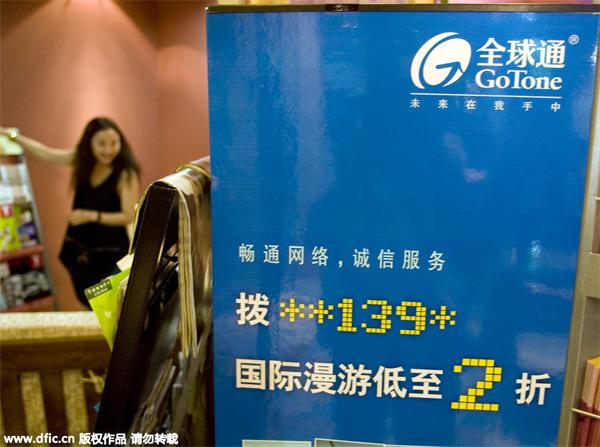It's time China and EU lifted all digital barriers
 |
|
An advertisement for discounting international roaming fees. [Photo/IC] |
Mobile phone users in China will not have to pay roaming charges while travelling within the Chinese mainland from October and people in European Union member countries will start enjoying the same concession within the union from mid-June.
Many in China say the move-made by China Mobile Communications, China United Network Communications and China Telecommunications-was influenced by cell phone users' shift to social media to communicate with friends and relatives. For example, there are more than 800 million WeChat users in China who can all use the app to send messages, buy tickets, order meals, book hotel rooms, and even hail taxis. Many other users prefer WhatsApp or Skype, which means the competitiveness of mobile phone service providers has been eroded.
To some extent, the same reason forced the EU telecom companies to scrap the roaming charges, although the Europeans generally spend less time on social media than their Chinese counterparts.
The EU has also been thinking of setting up a single digital market, which is high on the agenda of the European Commission. Cancelling the roaming charges is a decisive move by mobile phone service providers to unite the fragmented telecom market in the 28-member bloc, which is now facing tremendous existential challenges.
Of course, the move will slash the revenues of many telecom companies, because roaming charges account for nearly 10 percent of the net profits of China's big three telecom companies, and they are also a key source of revenue for EU companies. But the benefits of the cancellation of roaming charges to users will be immense as digital barriers will be lifted. For example, the monthly phone bill is likely to be less surprising for regular travellers, the cost of doing business may reduce and the communication flow could expand.
Operators in the EU and China should now consider other, bigger moves, since they have a combined market of 1.9 billion consumers.
China and the EU are now in tough negotiations to achieve a high-level investment agreement. Hopefully, the officials are also discussing the prospects of deeper market penetration by telecom companies in China and the EU. And now that Chinese and EU telecom companies have decided to cancel the roaming charges within their own economies, they should also consider cancelling international roaming charges for people travelling to and from the two economies.
Such a move has the potential to expand their digital markets. Although it may be difficult to persuade the telecom giants on both sides to do so, it will be worth the effort as it will make the use of mobile phones less taxing.
The telecom operators, in the long run, will have no reason to keep international roaming charges so high. Again, the benefits will be immense if a single EU-China digital market can be formed, as it will remove many communication barriers and help boost the flow of investments.
As the China-led Belt and Road Initiative (the Silk Road Economic Belt and 21st Century Maritime Silk Road) is aimed at bringing Asia, Europe and Africa closer, the formation of a EU-China digital market with free roaming will be an apt example of how to create an even bigger market.
Next year, the main theme of China-EU ties will be tourism. And the two sides would do better to discuss the possibility of cancelling roaming charges for mobile phone users travelling between the two economies, because it will help boost the tourism industries in both economies.
The author is deputy chief of China Daily European Bureau. fujing@chinadaily.com.cn


























